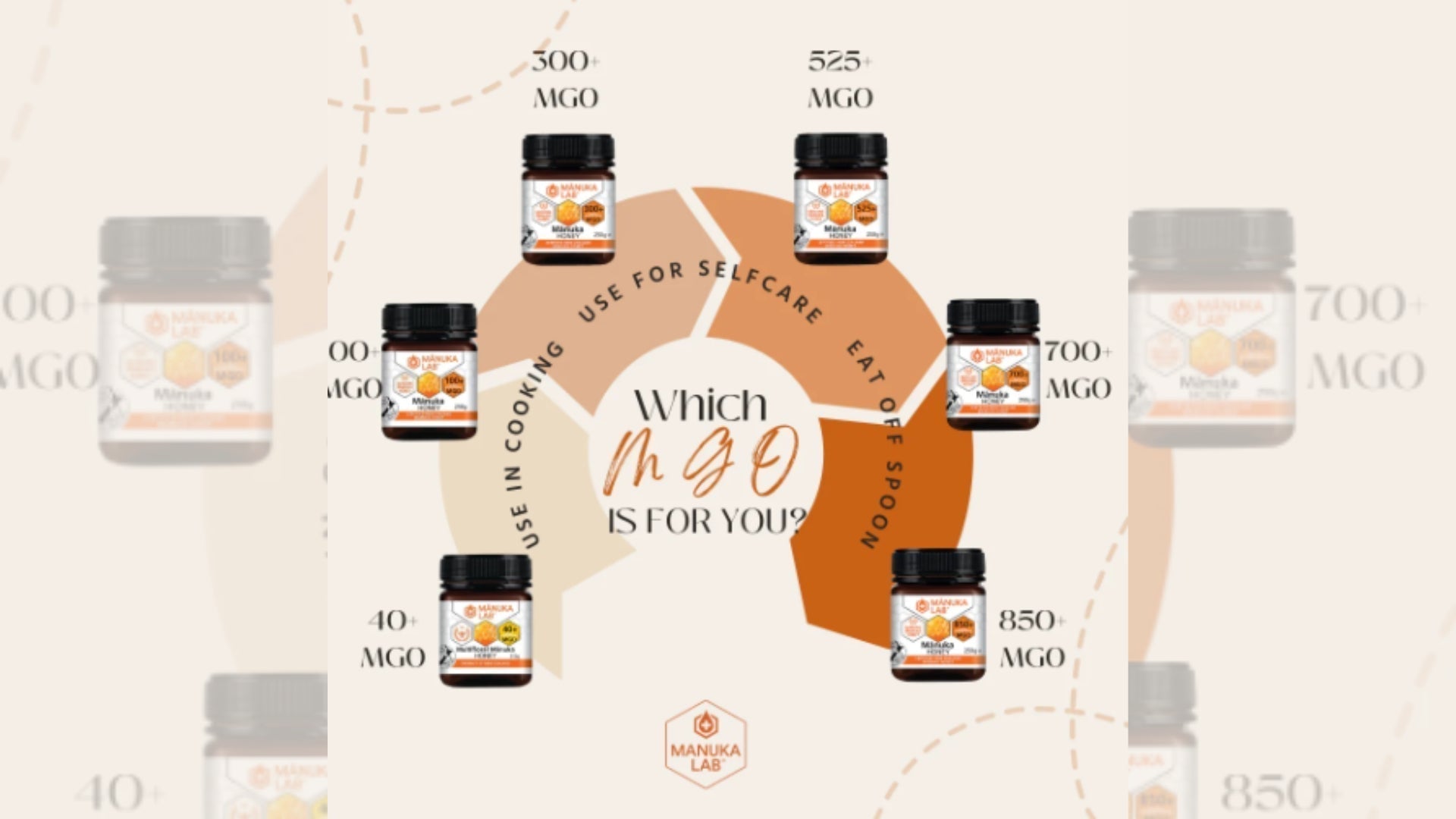

So, you have heard all about the marvel of Manuka Honey – but you aren’t 100 per cent sure which type to buy? With so much information, numbers, and letters to digest, it can be easy to feel overwhelmed at the prospect of buying your first Manuka product; especially if you can’t find the right information.
Mānuka is a gift from nature, produced from the nectar of the Mānuka bush and gathered by bees. Obtaining authentic Mānuka honey should feel easy – this is why at Mānuka Lab, we aim to make the process of buying the right MGO Mānuka Honey straightforward. With this in mind, let’s take a look at the labels – what does ‘MGO’ and its associated numbers mean, and which would be right for you.

What Does MGO Mean in Mānuka Honey?
MGO, short for Methylglyoxal, is the naturally occurring compound found in Mānuka honey that gives it its potent antibacterial properties. Unlike regular natural honey, which may contain minimal antibacterial activity, genuine Mānuka honey has been scientifically proven to contain high MGO levels.
The MGO number on a Mānuka honey jar indicates the amount of Methylglyoxal per kilogram of honey. For example:
-
MGO 100+ contains at least 100mg of Methylglyoxal per kg.
-
MGO 525+ has at least 525mg of Methylglyoxal per kg, offering stronger potency.
The higher the MGO content, the greater its ability to inhibit harmful bacteria, making it a sought-after choice for both general wellness and targeted support. Understanding the Mānuka honey MGO meaning is important when choosing the right product for your needs.
MGO Mānuka Honey – What The Labels Mean
The labels on Mānuka Lab Mānuka honey display an ‘MGO’ number, to demonstrate that the honey inside has been independently tested for the presence of Methylglyoxal, and its grade has been certified. This grading system ensures consumers are buying genuine Mānuka honey that meets strict requirements.
The higher the number, the higher the level of plant phenols inside the jar. The MGO grading system is vital for verifying the potency and authenticity of the product.
We recommend the lower levels of MGO Manuka Honey for daily use, while the higher strength Manuka is used when you need more support in your daily diet - such as during cold and flu season.
As an example of this, here are the MGO numbers we stock here at the Manuka Lab:

Mānuka Honey Grades Explained
Mānuka honey is graded based on its Methylglyoxal (MGO) content, which determines its strength and potential benefits. The higher the MGO rating, the more potent its antibacterial properties. Here’s a breakdown of common Mānuka honey grades:
MGO 40+ to 100+ – Mild and ideal for everyday wellbeing.
MGO 300+ – Offers moderate support, suitable for seasonal wellness.
MGO 525+ and above – High-strength Mānuka, often used for extra immune support.
MGO 850+ to 1125+ – Premium-grade, for targeted support and specific applications.
The quality and grading of genuine monofloral Mānuka honey are closely monitored by the New Zealand government to ensure authenticity. Each jar of Mānuka Lab honey is independently tested for its MGO levels, ensuring buyers receive raw Mānuka honey of the highest quality.
Monofloral vs Multifloral Mānuka Honey
Monofloral and multifloral are important distinctions when it comes to Mānuka honey. Monofloral Mānuka honey is made primarily from the nectar of dense Mānuka bushes, resulting in a purer product with higher concentrations of Mānuka-specific compounds, including MGO. Multifloral Mānuka honey, on the other hand, is made from a lower density Mānuka bushes, which means it typically contains lower levels of MGO and other characteristic plant phenols.
New Zealand’s regulations define these types based on the presence and concentration of certain chemical markers and Mānuka pollen. Monofloral Mānuka honey must meet stricter criteria for these markers, ensuring higher potency and purity, while multifloral Mānuka honey meets a lower threshold and may have a milder taste and effect.
When choosing Mānuka honey, pay attention to whether the product is labelled monofloral or multifloral, as this will impact both the MGO content and potential benefits.
Which MGO Manuka Honey Is Right For Me?
The ideal strength of your MGO Manuka Honey will depend on what you want to use it for, or your general lifestyle. For example, a daily spoonful in a cup of coffee or a drizzle over a breakfast cereal, can be at the lower end of the scale to aid your ongoing wellbeing, with a typically bitter than sweet flavour.
If you are particularly susceptible to picking up colds, a higher level of MGO will be better to use in your recipes – while not a cure, the antibacterial effects of Mānuka can at least help to support your overall wellbeing and immune system. These unique properties are the result of high MGO concentrations found naturally in nectar collected from Mānuka flowers.
If you’re still unsure, we have created this quick ‘Manuka MGO Chooser’ quiz which, after a few lifestyle questions, will recommend a suitable MGO strength based on your answers. If you have any additional questions beyond that, our team are always on hand to provide all the assistance you need.
Potential Side Effects and Considerations
While Mānuka honey is generally safe for most people, some may experience side effects, especially with higher MGO levels:
-
Allergies: Those allergic to bees or pollen may react to Mānuka honey.
-
Blood Sugar: Like all honey, it can raise blood sugar levels; people with diabetes should use caution.
-
Medication Interactions: If you’re taking medication or undergoing treatment, consult your healthcare provider.
-
Infants: Honey should not be given to children under 12 months.
If you’re new to Mānuka honey or trying a higher MGO grade, start with a small amount and monitor your response. Always consult a healthcare professional if you have health concerns.
Exploring Common MGO Strengths
Below, we have listed some of the typical MGO grades available. Each link will take you directly to a product page that offers the specified MGO level, so you can learn more about each variety and make an informed choice.
Manuka Honey 100 MGO Benefits
-
Ideal for daily wellbeing support.
-
Mildly stronger in Methylglyoxal content than standard supermarket honey, yet gentle enough to be used every day.
-
Excellent if you’re introducing Manuka honey into your routine for the first time.
-
Learn more about our Mānuka Honey 100+ MGO.
Perfect for those wanting to experience the benefits of buying genuine Mānuka honey for everyday use.
Manuka Honey 250 MGO Benefits
-
Provides a moderate step up in strength.
-
Suitable for those seeking more pronounced support during times of stress or seasonal changes.
-
Can be used in recipes or taken directly by the spoonful to complement your daily lifestyle.
-
Learn more about our Mānuka Honey 200+ MGO.
A great choice if you are exploring the potency of natural honey options with higher antimicrobial properties.
Manuka Honey 500 MGO Benefits
-
Contains a higher concentration of Methylglyoxal, making it well-suited for those seeking robust support.
-
Often chosen during the winter months or whenever you feel you need an extra boost.
-
The taste is notably rich and intense, reflecting its higher level of natural compounds.
-
Learn more about our Mānuka Honey 525+ MGO.
This variety is perfect for those seeking potent Mānuka products, helping support the body’s natural healing process.
The Role of MGO and NPA in Mānuka Honey
The strength of Mānuka honey is not only determined by the MGO content but also its non-peroxide activity (NPA), a critical measure of its antibacterial strength. Higher MGO levels generally correspond to higher NPA, meaning stronger antibacterial properties that can assist in treating wounds and inhibiting harmful bacteria.
MGO is a naturally occurring chemical compound, derived from the conversion of DHA (dihydroxyacetone) found in the nectar of the Mānuka flowers. It is this conversion that gives Mānuka honey its unique potency and effectiveness.
Understanding MGO grading and non-peroxide activity can help ensure you choose Mānuka honey suited for your specific health needs.
Why Buy Genuine Mānuka Honey?
The demand for genuine Mānuka honey has led to strict requirements enforced by the New Zealand government. Only honey that meets specific chemical markers, including Mānuka pollen concentration and MGO content, can be exported as authentic Mānuka honey.
When you buy Mānuka honey from Mānuka Lab, you can trust that you are purchasing a product that has undergone rigorous tests for authenticity, purity, and potency. Our honey is sustainably harvested from bees that forage exclusively on the Mānuka bush, ensuring the finest quality.
Choosing to buy Mānuka honey with a verified MGO number helps guarantee you are receiving genuine, potent Mānuka honey that offers true health benefits.
Shop Genuine Manuka with Manuka Lab

Here at the Manuka Lab, we are leading providers of Manuka Honey in the UK. Our genuine New Zealand Manuka honey is sustainably harvested from New Zealand’s indigenous ‘Super Plant’ grown in the remotest areas of the East Cape region, ensuring quality, potency and hive to jar traceable origin.
Please take the time to browse our product selection – each clickable product page contains specific information about the items; their uses, ingredients, MGO grading and more.
If you have any questions about the items you see, or on any aspect of MGO Manuka Honey, we would be pleased to hear from you! Send us an e-mail at wecare@manukalab.co.uk


